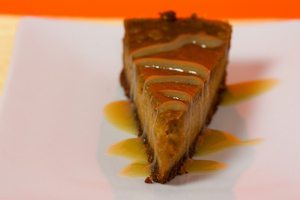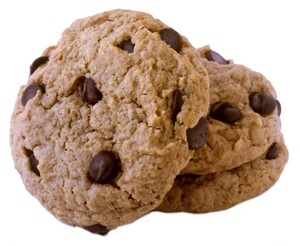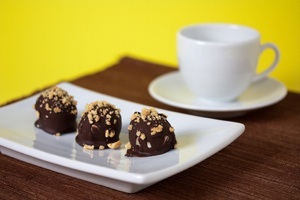Coconut Oil

Coconut oil comes from the meat or kernel of the coconut from the coconut palm. In vegan baking applications coconut oil is very useful because it's solid at room temperature and contains no trans fats. Due to it being solid at room temperature it works wonderfully as a shortening or butter substitute in things like frostings, spreads, pound cakes, shortbread, etc. It's also one of the main ingredients in Vegan Butter.
Coconut oil is great for high heat applications because it has a high smoke point of 360F (180C). It's high amount of saturated fats allows it to have extraordinary shelf life, approaching two years without going rancid. These saturated fats also allow it to be solid at room temperature and melt at around 76F (24C).
Coconut Oil is extracted from the coconut in two main ways. The wet method, which is how it's done traditionally, involves shredding the coconut meat, adding a little water to it, then squeezing it to extract coconut milk. This is then set aside for 12 to 24 hours to allow the coconut milk to rise to the top where it's skimmed off, resulting in coconut oil underneath.
The dry method involves shredding the coconut meat, dehydrating it, then squeezing the coconut meat to extract the oil.
Coconut Oil is available in two types for baking:
Unrefined Coconut Oil
Unrefined coconut oil is just regular plain old coconut oil extracted from the coconut. Coconut can be a wonderful flavor enhancer in baked goods. It's flavor and aroma can also get in the way and color other flavors in undesirable ways depending on what you're making. This is why you also have the option of using refined coconut oil.Refined Coconut Oil
Refined coconut oil is additionally processed to remove coconut flavors and aromas which can be useful when you're trying to avoid coconut flavors in your baked goods.Refined coconut oil, also known as RBD coconut oil which stands for refined, bleached and deodorized, is made from dried coconut kernels called copra. The copra is left in out in the sun to dry for days. The oil is pressed out of the copra, then passed through clays containing high amounts of calcium carbonate which filters and bleaches the oil. Then it's heated to a very high temperature to deodorize it and sterilize it. After that, sodium hydroxide is often added to eliminate excess monounsaturated fats.
Virgin Coconut Oil
Virgin coconut oil is oil extracted from the coconut using no chemical means. Due to this it's often more flavorful, nutrient dense and healthier overall than non-virgin coconut oil. This type of coconut oil is more expensive than regular coconut oil so if it doesn't specify that it's virgin on the package, it's probably not.The Great Coconut Oil Health Debate
In the last several decades there have been many conflicting reports on the health benefits and drawbacks of coconut oil. Originally, coconut oil got swept into the whole "all saturated fats are bad" hype of the 80's and was shunned by health experts. Some say this was also due to a conspiracy of the soy industry. Other possibilities may be that early studies on coconut oil's health benefits showed poor results because they involved hydrogenated, trans fat laden coconut oil.Coconut oil contains 92% saturated fats. Saturated fats from animal sources are bad, but what these scientists didn't take into account in the 80's was that coconut oil has a different type of saturated fat that may work differently in the body. Coconut oil's saturated fat is made up of medium-chain fatty acids which is in contrast to animal-based saturated fat mainly consisting of long-chain fatty acids. Medium-chain chain fatty acids have anti-microbial properties and since they're smaller, consisting of 6 to 12 carbon atoms, they can be absorbed and turned into energy more easily than animal-based saturated fat. Animal-based saturated fat consists mostly of long-chain fatty acids that are larger, 12 to 18 carbon atoms, which are handled differently and more likely to be stored in the body as fat.
It's important to exercise caution however when jumping on the "coconut oil as a superfood" bandwagon. Many of these studies are just that: scientific studies which usually have an extremely large margin of error. A more accurate representation of coconut oil's health benefits may be to assess the health and longevity of populations in countries where coconut oil is widely consumed. As of this writing, I'm not aware of significant health and longevity advantages of these populations compared to other geographic regions. And besides, you're reading a baking website so what to you care
Coconut oil is arguably slightly more eco friendly than palm kernel oil-based non-hydrogenated margarines because, as of this writing, there appears to be less rainforest deforestation associated with coconut palm cultivation than there is with oil palm cultivation, which is where palm kernel oil is derived.
When solid-at-room-temperature fats are needed, coconut oil and palm oil-based vegetable shortenings are your best bet.





